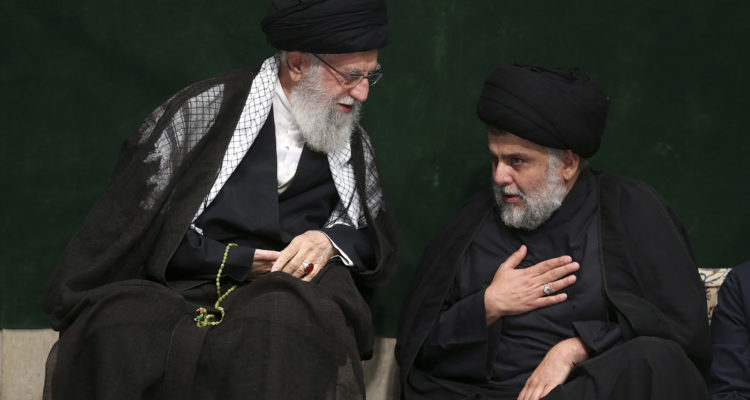“Tehran is engaged in a shadow war, striking at countries in the Middle East but thinly disguising the origin of those attacks to reduce the chance of provoking a response,” say the sources.
By World Israel News Staff
As Prime Minister Benjamin Netanyahu continues to warn Tehran that the Jewish State has a “long arm” to strike wherever the Islamic Republic’s forces are mobilized, the latest report on just how aggressive the Iranians have become was published Wednesday in The New York Times.
“Iran has used the continuing chaos in Iraq to build up a hidden arsenal of short-range ballistic missiles in Iraq, part of a widening effort to try to intimidate the Middle East and assert its power, according to American intelligence and military officials,” says the paper.
As far back as August, Israel was being “blamed” for a series of airstrikes on Iraqi territory.
Top U.S. and Israeli officials are said to have been meeting on a regular basis on the Iranian issue. It was a key issue discussed when Prime Minister Benjamin Netanyahu held talks on Wednesday with Secretary of State Mike Pompeo.
“The Israeli-American policy is key to that effort that serves the purposes of many, many countries in the region,” said Netanyahu, accusing Iran of having “staging grounds against us and the region from Iran itself, from Iraq, from Syria, from Lebanon, Gaza, and Yemen and we are actively engaged in countering that aggression.”
The Iranian buildup “comes as the United States has rebuilt its military presence in the Middle East to counter emerging threats to American interests, including attacks on oil tankers and facilities that intelligence officials have blamed on Iran,” reports The Times.
“Since May, the Trump administration has sent roughly 14,000 additional troops to the region, primarily to staff Navy ships and missile defense systems.”
“But new intelligence about Iran’s stockpiling of missiles in Iraq is the latest sign that the Trump administration’s efforts to deter Tehran by increasing the American military presence in the Middle East have largely failed,” reports the newspaper, citing intelligence officials as saying that “the missiles pose a threat to American allies and partners in the region, including Israel and Saudi Arabia, and could endanger American troops.”
Iraqis “do not want to be led around on a leash by the Iranians,” Rep.Elissa Slotkin (D-Mich.), a member of the House Armed Services Committee, said in an interview with the Times. “But, unfortunately, due to the chaos and confusion in the Iraqi central government, Iran is paradoxically the best poised to take advantage of the grass-roots unrest.”
Iranian officials did not return a request for comment, says the Times.
Baghdad-Jerusalem
The military and intelligence officials at the center of the newspaper’s report say that “Tehran is engaged in a shadow war, striking at countries in the Middle East but thinly disguising the origin of those attacks to reduce the chance of provoking a response or escalating the fight.”
“If the United States or Israel were to bomb Iran, its military could use missiles hidden in Iraq to strike back against Israel or a gulf country,” the report says.
Short-range missiles have a range of just over 600 miles, meaning that one fired from the outskirts of Baghdad could strike Jerusalem, notes the Times.
“People are not paying enough attention to the fact that ballistic missiles in the last year have been placed in Iraq by Iran with the ability to project violence on the region,” according to Slotkin, an expert on Shiite militias who recently visited Baghdad to meet with Iraqi and American officials, says the paper.
Slotkin is said to have pressed Iraqi leaders on the threat from Iran, telling them that if Iran launched a missile from Iraqi territory, it could threaten the American training effort in Iraq and other support from the United States.
The United States is concerned about potential Iranian aggression in the near future, John C. Rood, an undersecretary of defense, told reporters on Wednesday, according to the Times, but he provided no details about what prompted the concerns.
While decades of international sanctions have weakened the Iranian military, the U.S. Defense Intelligence Agency (DIA) says that Tehran has invested in its domestic infrastructure, allowing it to continue to develop capable cruise and ballistic missiles.
“Iran will deploy an increasing number of more accurate and lethal theater ballistic missiles, improve its existing missile inventory and also field new land-attack cruise missiles,” warns Christian Saunders, Senior Defense Intelligence Analyst for Iran at the DIA.
Aside from its missiles, “another point of concern to the United States and our allies is Iran’s rapid progress in advancing its UAV [unmanned aerial vehicle] capabilities,” says Saunders.
In June, Iran shot down a U.S. Navy high-altitude drone, firing a surface-to-air missile in the area of the Strait of Hormuz.




